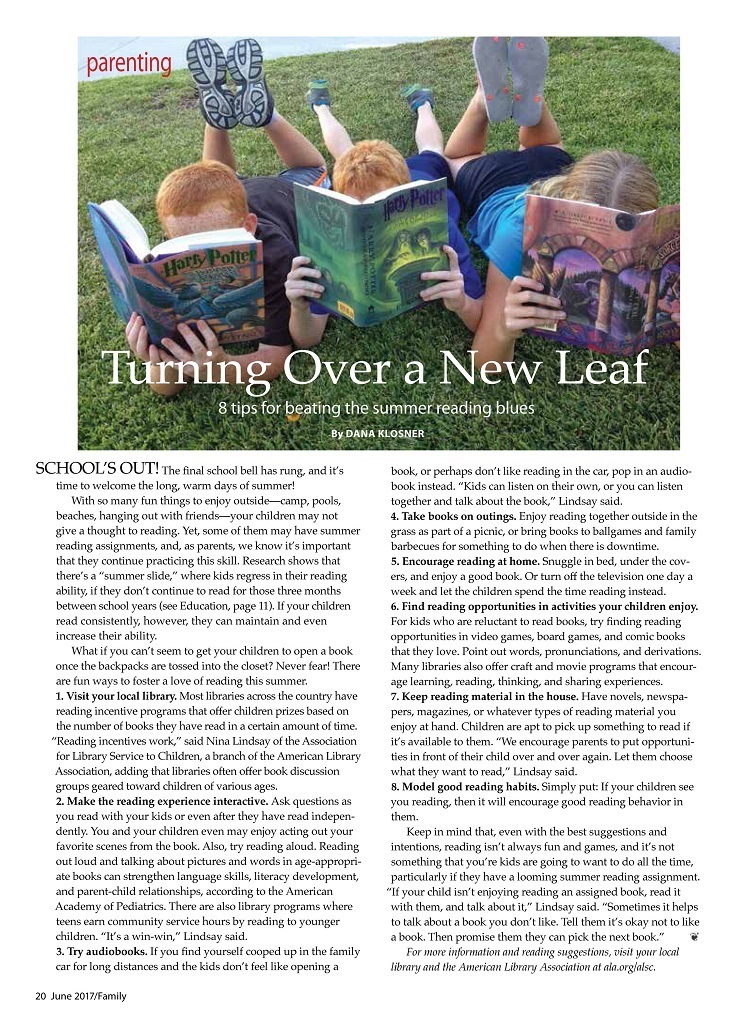parenting
VO
200
any Pater
Harly Potter
AYOTTE
Turning Over a New Leaf
S
8 tips for beating the summer reading blues
By DANA KLOSNER
SCHOOL’S OUT! The final school bell has rung, and it’s time to welcome the long, warm days of summer!
With so many fun things to enjoy outside-camp, pools, beaches, hanging out with friends—your children may not give a thought to reading. Yet, some of them may have summer reading assignments, and, as parents, we know it’s important that they continue practicing this skill. Research shows that there’s a “summer slide,” where kids regress in their reading ability, if they don’t continue to read for those three months between school years (see Education, page 11). If your children read consistently, however, they can maintain and even increase their ability.
What if you can’t seem to get your children to open a book once the backpacks are tossed into the closet? Never fear! There are fun ways to foster a love of reading this summer. 1. Visit your local library. Most libraries across the country have reading incentive programs that offer children prizes based on the number of books they have read in a certain amount of time. “Reading incentives work,” said Nina Lindsay of the Association
for Library Service to Children, a branch of the American Library Association, adding that libraries often offer book discussion groups geared toward children of various ages. 2. Make the reading experience interactive. Ask questions as you read with your kids or even after they have read independently. You and your children even may enjoy acting out your favorite scenes from the book. Also, try reading aloud. Reading out loud and talking about pictures and words in age-appropriate books can strengthen language skills, literacy development, and parent-child relationships, according to the American Academy of Pediatrics. There are also library programs where teens earn community service hours by reading to younger children. “It’s a win-win,” Lindsay said. 3. Try audiobooks. If you find yourself cooped up in the family car for long distances and the kids don’t feel like opening a
book, or perhaps don’t like reading in the car, pop in an audio book instead. “Kids can listen on their own, or you can listen together and talk about the book,” Lindsay said. 4. Take books on outings. Enjoy reading together outside in the grass as part of a picnic, or bring books to ballgames and family barbecues for something to do when there is downtime. 5. Encourage reading at home. Snuggle in bed, under the covers, and enjoy a good book. Or turn off the television one day a week and let the children spend the time reading instead. 6. Find reading opportunities in activities your children enjoy. For kids who are reluctant to read books, try finding reading opportunities in video games, board games, and comic books that they love. Point out words, pronunciations, and derivations. Many libraries also offer craft and movie programs that encourage learning, reading, thinking, and sharing experiences. 7. Keep reading material in the house. Have novels, newspapers, magazines, or whatever types of reading material you enjoy at hand. Children are apt to pick up something to read if it’s available to them. “We encourage parents to put opportunities in front of their child over and over again. Let them choose what they want to read,” Lindsay said. 8. Model good reading habits. Simply put: If your children see you reading, then it will encourage good reading behavior in them.
Keep in mind that, even with the best suggestions and intentions, reading isn’t always fun and games, and it’s not something that you’re kids are going to want to do all the time, particularly if they have a looming summer reading assignment. “If your child isn’t enjoying reading an assigned book, read it with them, and talk about it,” Lindsay said. “Sometimes it helps to talk about a book you don’t like. Tell them it’s okay not to like a book. Then promise them they can pick the next book.”
For more information and reading suggestions, visit your local library and the American Library Association at ala.org/alsc.
20 June 2017/Family
